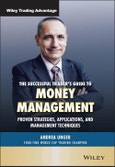Discover how to maximize the effectiveness of your trading techniques by applying the right money management techniques
Money management is a central element of trading the financial markets, especially in uncertain times. Yet investors often misinterpret the central concepts of money management. To manage risk and obtain optimal rewards from your trades, you will benefit from a deeper understanding of how the professionals manage money. The Successful Trader’s Guide to Money Management describes the operating methods that seasoned investors use. With this book, you’ll avoid the common mistake of focusing too much on entry levels and stop-losses, and you’ll learn to consider the impact of proper money management on your final portfolio results.
Successful traders focus on risk management, avoiding opening positions that are too large with respect to the total capital they have available. Packed with practical examples and with special focus on money management or position-sizing, The Successful Trader's Guide to Money Management offers a comprehensive coverage of widely practiced risk management models, examining their strengths and weaknesses. You will learn how to use the most effective operating models, including the Fixed Fractional, Fixed Ratio, and Percent Volatility models. This book also provides a thorough analysis of portfolio management models. These essential tips will nudge you toward a more winning position as you enter your next trades.
- Learn how the professionals manage money and avoid common trading mistakes
- Design a trading system that minimizes risk and maximizes reward through correct position sizing
- Understand the most important money and portfolio management models, including Fixed Ratio, Percent Volatility, Fixed Fractional, and more
- Equip yourself to trade smarter, individually or with a broker, on equity, derivatives and Forex markets
For individual and institutional investors alike, this book is a ticket to more solid trading strategy, especially in uncertain times.
Table of Contents
Foreword xi
Preface xiii
Chapter 1 Martingale and Anti-Martingale 1
1.1 The Right Stake 1
1.2 Martingale 2
1.3 Anti-Martingale 9
1.4 More Examples 15
1.5 A Miraculous Technique? 17
1.6 Conclusions 20
Chapter 2 The Kelly Formula 21
2.1 Kelly and Co. 21
2.2 Conclusions 31
Chapter 3 A Banal Trading System 33
3.1 Analyzing a System Based on Moving Averages 33
3.2 Applying the Kelly Formula 37
3.3 Conclusions 52
Chapter 4 Money Management Models 53
4.1 The Fixed Fractional Method 54
4.2 Optimal f 60
4.3 Secure f 65
4.4 Fixed Ratio 68
4.5 Percent Volatility Model 81
4.6 Levels for Changing the Number of Contracts 91
4.7 Conclusions 92
Chapter 5 Refining the Techniques 94
5.1 The Importance of the Trader’s Temperament 94
5.2 Reduced f 95
5.3 Aggressive Ratio 97
5.4 Asymmetric Ratio 99
5.5 Timid Bold Equity 100
5.6 Equity Curve Trading 103
5.7 z-Score 110
5.8 Conclusions 112
Chapter 6 The Monte Carlo Simulation 114
6.1 Using the Monte Carlo Simulation 114
6.2 Maximum Loss 135
6.3 Conclusions 139
Chapter 7 The Work Plan 141
7.1 Using a Work Plan 141
7.2 Conclusions 155
Chapter 8 Combining Forces 157
8.1 Using a Combination of Systems 157
8.2 Portfolio Money Management 168
8.3 Which Capital? 169
8.4 The Effects of Portfolio Money Management 173
8.5 Conclusions 180
Chapter 9 Money Management When Trading Stocks 181
9.1 Trading in the Stock Market 181
9.2 Conclusions 192
Chapter 10 Portfolio Management 193
10.1 A Portfolio Approach 195
10.2 Some Improvements to the System 208
10.3 Conclusions 214
Chapter 11 Discretionary Trading 215
11.1 Trading Criteria and Definition 215
11.2 An Example: Mediaset 218
11.3 Adjusting Volatility During the Trade 225
11.4 Trading Futures 228
11.5 Conclusions 245
Chapter 12 Questions and Answers 246
Appendix I 252
I.1 The Impact of a Trading System on Planning 252
I.2 The Trading System 252
Appendix II 268
II.1 Understanding the Type of Strategy 268
Appendix III 278
III.1 The Advantages of Forex 278
Appendix IV Online Trading 282
IV.1 The Trader 282
IV.2 Trading Profits 284
IV.3 Systematic or Discretionary? 286
IV.4 Choosing the Broker 287
IV.5 Which Platform? 288
Index 291








